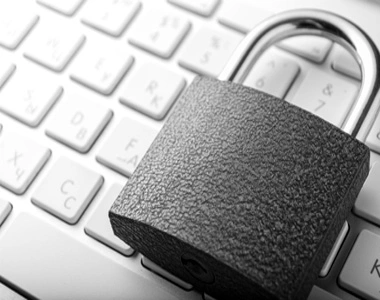Hard Disk Encryption - Data Security
Hard disk drive (HDD) encryption is a security technique that aims to protect data stored on the device by making it inaccessible without the appropriate security key. There are different encryption methods and algorithms that can be applied to an HDD.
When using encryption on an external HDD, Even if the device is lost or stolen, the data remains secure as long as the decryption key is not compromised. This approach is critical to protecting sensitive information on storage devices.
In a typical scenario using full disk encryption (FDE), we have:
Encryption Key: When you enable encryption on a hard drive, the operating system or a specific tool generates an encryption key. This key is usually a long sequence of bits.
Encryption Algorithm: An encryption algorithm is chosen to protect the data. A common example is AES (Advanced Encryption Standard), which is widely used due to its security and efficiency.
Data Encryption: All data stored on the HDD is encrypted using the generated key and the chosen algorithm. This means that even if someone gains physical access to the disk, the data will be unreadable without the decryption key.
Setor de Boot e Autenticação: On many systems, a special boot sector is separately encrypted. Before the operating system boots, you must authenticate and provide the decryption key. This is typically done via a password, PIN, USB key, or other authentication method.
On-the-Fly Decryption: When you access or write data to the HDD, it is automatically encrypted or decrypted in real time. This occurs transparently for the user, without requiring constant intervention.
Key Security: The security of the encryption key is critical. If someone gains access to the key, they can decrypt the data. Therefore, systems often implement measures to protect and manage these keys, such as strong passwords, two-factor authentication, or secure key storage.

10 Data Encryption Software Tips
There are several encryption software currently used to protect data in different contexts.
- BitLocker (Windows): BitLocker is an encryption tool built into Windows that offers full-disk encryption. It supports multiple authentication options such as a password, PIN, or USB key. BitLocker is available in the professional and enterprise editions of Windows.
- VeraCrypt: An open source encryption tool that is a successor to TrueCrypt. VeraCrypt is cross-platform, running on Windows, macOS, and Linux. It allows the creation of encrypted volumes and offers several encryption algorithm options.
- FileVault (macOS): FileVault is an encryption solution built into macOS. It provides full-disk encryption, helping protect data on Macs. Users can configure FileVault in the system security preferences.
- LUKS (Linux Unified Key Setup): LUKS is an encryption standard used on Linux systems. It offers the ability to encrypt entire partitions and volumes. Many Linux distributions natively support LUKS during installation.
- Symantec Endpoint Encryption: An enterprise solution that provides full disk encryption and other security features. It is designed for enterprise environments and offers centralized management.
- McAfee Drive Encryption: Offers full disk encryption for Windows and macOS systems. It is an enterprise solution that can be centrally managed.
- DiskCryptor: An open source software for Windows that offers full disk encryption. It supports multiple encryption algorithms and is a lightweight and efficient option.
- CipherShed: Another fork of TrueCrypt, which is an open-source tool, CipherShed allows the creation of encrypted volumes and is designed to be a secure alternative.
- Cryptsetup (Linux): A command-line tool for configuring disk encryption on Linux using LUKS. It is a common option for Linux systems that do not have an integrated graphics solution.
- Samsung Magician (for Samsung SSDs): If you are using a Samsung SSD, Samsung Magician software includes security features including disk encryption. Be sure to check compatibility with your specific SSD model.
When choosing disk encryption software, it is important to consider specific system requirements, ease of use, operating system compatibility, and management needs, especially in enterprise environments. Additionally, always keep your software updated to ensure ongoing security.

Bitlocker
BitLocker is an encryption technology developed by Microsoft designed to provide data protection on storage devices such as internal and external hard drives, USB drives, and volume partitions. Integration with Windows occurs, with BitLocker integrated into the Windows operating system and available in professional and enterprise editions of Windows, such as Windows 10 Pro and Windows 10 Enterprise.
BitLocker is commonly used for full disk encryption (FDE), covering the entire contents of the disk, including the operating system, installed programs, and user data. To protect data, BitLocker uses encryption keys, offering several options for storing and managing these keys, such as passwords, recovery keys, smart cards, and the Trusted Platform Module (TPM).
Configurable to use TPM, a trusted platform module, BitLocker provides an additional layer of security by storing encryption keys and ensuring system integrity. In addition to traditional passwords, BitLocker supports pre-boot authentication, requiring a PIN before the operating system loads, protecting against boot attacks.
BitLocker also allows you to configure key recovery options, such as creating a recovery key for situations where you forget your password or encounter boot issues. Supporting different modes of operation, including hardware encryption mode for improved performance, BitLocker, although exclusive to Microsoft, offers compatibility when opening BitLocker volumes on other operating systems using a password or recovery key.
By using BitLocker, users and organizations can ensure that data stored on Windows devices is protected from unauthorized access, even if the device is lost or stolen. This solution is particularly valuable for protecting confidential and sensitive information.
Important Reminder: Keep your BitLocker Recovery Key! From time to time, test recovery using the Recovery Key to ensure you can access your data when needed.
BitLocker Recovery Key is essential to recover your data in emergency situations, such as a forgotten password or boot problems. Without the Recovery Key, access to encrypted data may be lost permanently.
Conclusion
The security of an encrypted disk depends on several factors, including the strength of the encryption algorithm used, the implementation of the software or hardware, the proper management of encryption keys, and the secure behavior of the user.







